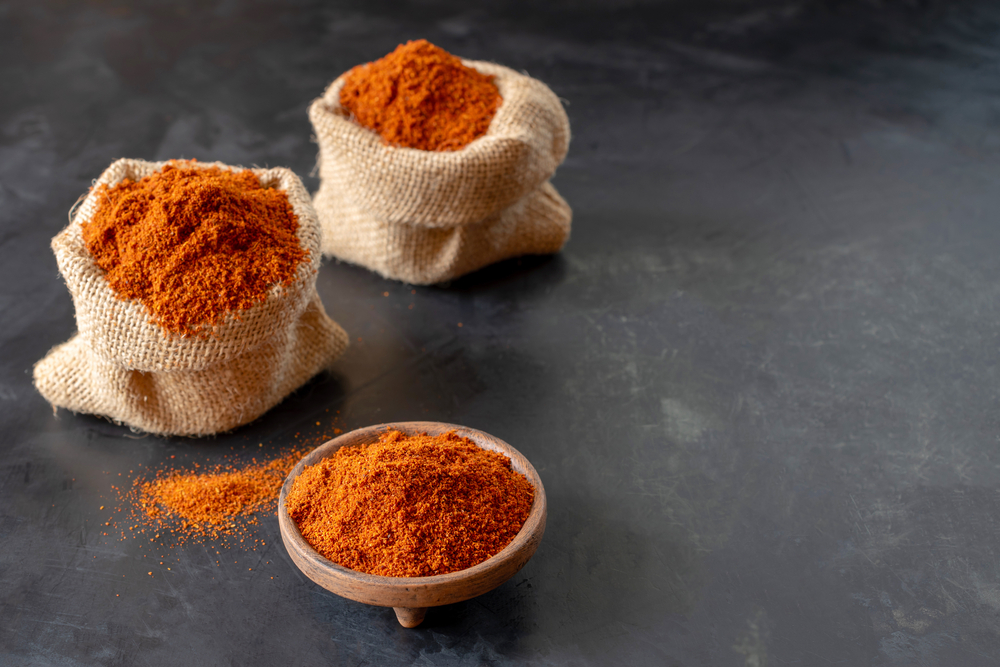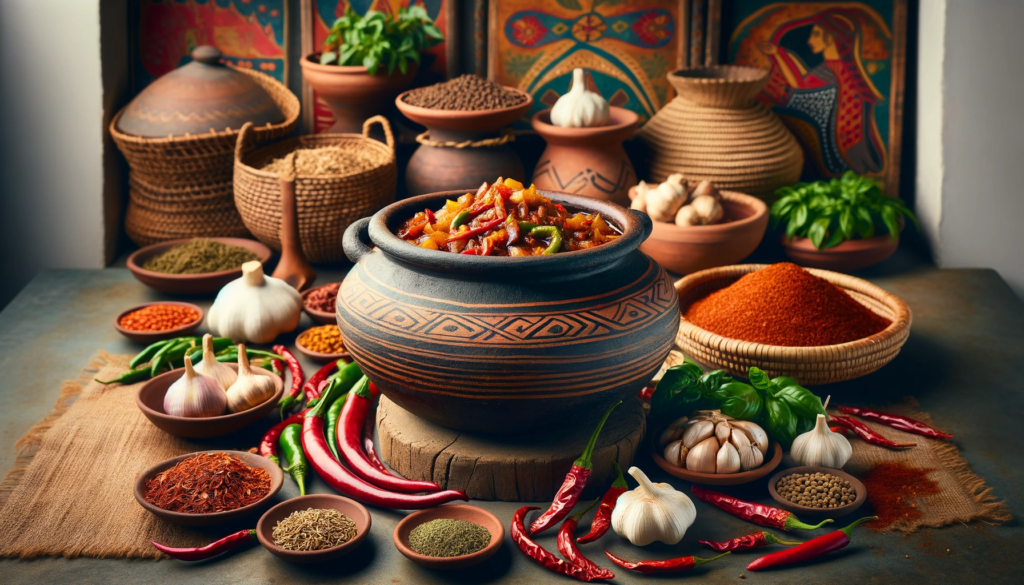Exploring Berbere: Ethiopia’s Signature Spice Blend
The Ingredients and Flavor Profile of Berbere
Berbere is the quintessence of Ethiopian flavor, a complex melange that is both earthy and fiery. The concoction typically comprises chili peppers that lay the groundwork for heat, supplemented by aromatic ginger, garlicky notes, and the warming buzz of fenugreek. Sweet undertones emerge from the presence of cinnamon and allspice, while coriander and cumin introduce a citrusy and nutty essence. The spiciness is balanced with the herbal freshness of Ethiopian rue and ajowan—spices found nestled in the hills of Ethiopia. This synergy of spices creates a heat that’s enveloping rather than sharp, a tapestry of tastes that dance on the palate, paying homage to the country’s love for layered seasoning.
Historical Roots and Cultural Importance of Berbere in Ethiopian Cooking
Historically, berbere is more than a spice blend—it’s a symbol of Ethiopian identity. Its origins weave back through the country’s culinary narrative, deeply entwined with ancient trading routes. A time-honored tradition, berbere’s preparation is a ritual passed down through generations, signifying the continuity of Ethiopian culture. In the communal Ethiopian kitchen, berbere plays a vital role not only in everyday meals but also in ceremonial dishes prepared for religious festivals, marriages, and significant life events. The palette of spices in berbere reflects the intertwining of Ethiopia’s history with that of its neighbors and the wider world—testimony to an exchange of commodities and ideas along the Silk Road and beyond.

Berbere in Traditional Ethiopian Dishes
Classic Ethiopian Recipes Enhanced by Berbere
In Ethiopian cuisine, berbere is the beating heart of numerous time-honored recipes. It is the signature seasoning in Doro Wat, a spicy chicken stew that luxuriates in a berbere-infused sauce, deeply reddened and rich in flavors. Just as pivotal is its role in Misir Wat, where it merges with lentils to create a dish that’s both comforting and bold. Berbere imparts not only heat but also a depth of flavor to sautéed dishes like Tibs, where strips of meat are elevated by its aromatic caress. The infusion of berbere into these classic dishes not only heightens the dishes’ profiles but also conveys the distinct culinary narrative of Ethiopia.
The Role of Berbere in Ethiopian Stews and Sauces
Berbere is vital to the complexity and soul of Ethiopian stews, known as wats or wots. These slow-cooked concoctions often start with a base of onions, garlic, and niter kibbeh—a clarified butter infused with herbs and spices. Berbere is then introduced, its deep rouge bleeding into rich sauce that serves as both a flavor base and a thickening agent. The blend’s versatility is showcased through an array of wats, from the hearty Kitfo to the vegetarian Shiro Wat. The liberal application of berbere in these dishes encapsulates the boldness of Ethiopian cooking, revealing a culinary culture that dares to delve into the potent pleasures of the spice.
Bringing Berbere into the Home Kitchen
Crafting Your Own Berbere Blend
Integrating the fiery spirit of berbere into the home kitchen starts with crafting your personal spice blend. Traditionally, families in Ethiopia would have their own proprietary mixtures, often passed through heirlooms of spice knowledge. To begin, source fresh, quality spices and toast them slightly to unveil their aromatic potential. Grind the spices, for this allows you to customize the heat and flavor profile. While dried red chilies create the foundation, adding a preferred balance of garlic, ginger, fenugreek, and the rest allows a personal interpretation of this cherished spice. Every homemade batch is an invitation to explore the nuances and personalized touch to Ethiopian cooking.
Tips for Cooking with Berbere
When introducing berbere into your culinary repertoire, a thoughtful approach is key. Start with moderation, adding the spice blend in increments and tasting as you go, because its heat can quickly intensify. Berbere pairs exceptionally well with legumes and grains, bringing life to lentils and elevating rice dishes to a new realm of flavor. Think of it as a dry rub to impart complex notes to grilling meats or as a vibrant addition to vegetables, granting them a smoky, earthy zest. When cooking with berbere, consider the fat content in your dishes; it helps to carry and mellow out the spices, ensuring a balanced sensory journey. Most importantly, allow berbere to simmer and meld with other ingredients to fully express its multifaceted flavor.
Berbere Beyond Ethiopia: A Global Spice
The Influence of Berbere in International Cuisine
The robust charisma of berbere has now traversed beyond the highlands of Ethiopia and into global kitchens. International chefs have been drawn to its scintillating flavors, ingeniously incorporating it into their culinary creations. Berbere has found its way into barbecue sauces, imparting an unexpected burst of Ethiopian fervor into American classics. It is also increasingly common in signature spice rubs for inventive tacos or vibrant curry blends, marrying it with ingredients far afield from its origins. The global march of berbere reflects not only the diaspora of its people but also the universal desire to connect over shared experiences of food and flavor.
Fusion Recipes and Modern Takes Using Berbere
Modern culinary fusion has embraced berbere, with chefs infusing global dishes with this Ethiopian marvel. Contemporary versions of mac ‘n’ cheese are spiked with its vibrant hues, while berbere-infused aioli has emerged as a trendy condiment for burgers and wraps. Innovative pizzerias sprinkle it atop pies, and artisan chocolatiers have concocted spiced truffles with hints of its heat. These modern takes on classic recipes reveal the versatility of berbere, showcasing its ability to harmonize with diverse flavor profiles and asserting its place within the contemporary spice arsenal.
Experiencing the Rich Flavors of Ethiopia

Authentic Ethiopian Recipes with Berbere
Experiencing the authentic taste of Ethiopia necessitates delving into recipes layered with berbere. Injera, the spongy sourdough flatbread that is a staple of Ethiopian dining, serves as the perfect vehicle for berbere-rich stews. True aficionados seek out classic recipes such as Doro Wat and Misir Wat, cooked following time-honored methods that do justice to the vigorous spice blend. For those looking to capture the essence of Ethiopian culinary tradition, embracing recipes that showcase berbere in its full glory is the ideal starting point.
Contemporary Dishes Inspired by Berbere’s Bold Flavors
While tradition holds a sacred place in Ethiopian cuisine, contemporary dishes inspired by berbere’s bold flavors also deliver astounding experiences. Chefs across the globe have taken to integrating the spice blend in unexpected ways, like in savory oatmeal topped with a berbere-infused fried egg or roasted vegetables enlivened with its zest. Whether it’s through the creation of spiced nut mixes for snacking or berbere-laced breading for fried chicken, the essence of Ethiopian flavors shines through in these innovative and inspired culinary concoctions.
Berbere in Ethiopian Cuisine: FAQs
What is the best way to store berbere spice blend?
To preserve the pungency and potency of berbere, it should be stored in an airtight container, away from direct sunlight and heat. Keeping it in a cool, dark place like a pantry or cupboard will help maintain its vibrant flavors. For long-term storage, refrigeration can further extend its shelf life.
Can berbere be too spicy, and how do you adjust its heat?
Berbere is known for its heat, but this can be adjusted. Start with smaller amounts and gradually increase according to your heat tolerance. Mixing berbere with other spices or adding sweeteners like honey can also help to mellow its intensity.
Are there health benefits associated with berbere?
Berbere is not just flavorful but also packed with health benefits, thanks to its constituent spices. It boasts anti-inflammatory properties, antioxidants, and can aid in digestion and boost metabolism, among other healthful qualities.
How do you authentically cook with berbere in Ethiopian cuisine?
Authentic Ethiopian cooking with berbere involves building layers of flavor, often starting with onions and niter kibbeh. Slowly incorporating berbere into the dish allows the spices to infuse the food, creating a deep, complex flavor profile characteristic of Ethiopian cuisine.
What are some common dishes that use berbere?
Doro Wat and Misir Wat are classic Ethiopian dishes that prominently feature berbere. It is also used in vegetarian dishes like Gomen Wat and in various meat stews and sauces.
Can berbere be used in vegetarian or vegan dishes?
Absolutely! Berbere is a fantastic way to impart deep, rich flavor into vegetarian and vegan dishes. It can transform simple ingredients like lentils and vegetables into mouthwatering meals.
Is there a substitute for berbere if I can’t find it?
While unique in flavor, a blend of paprika, cayenne pepper, garlic powder, ginger, and a mix of ground allspice, coriander, and fenugreek can serve as a makeshift berbere substitute in a pinch.
